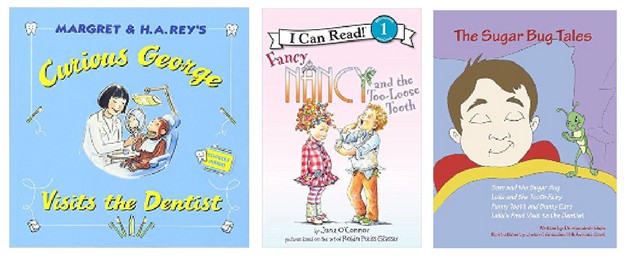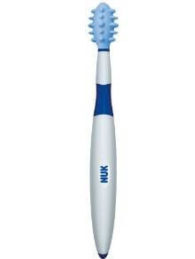Being a dentist is a wonderful career choice. It means you want to help people be mouth healthy and make a difference in their health and well-being.
Most people think being a dentist means putting your fingers in people’s mouths and looking for cavities, but there’s a lot more to it than that. Dentists work in lots of places outside the dental office, including hospitals, laboratories, the military, and schools—where they teach future dentists like you!
Here are some other great reasons to be dentist:
- You get to help people be healthy and feel better.
- Every day, you get to improve people’s smiles.
- Dentists are leaders.
- Science is cool. So is art. Dentists get to do both.
- You get to be your own boss and own your own business.

Curious George Visits the Dentist by H.A. Rey. A loose tooth and a visit to the dentist includes activities and stickers for ages 4 – 7.
Fancy Nancy and the Too Loose Tooth by Jane O’Connor is for ages 4 – 8. Nancy want to make sure her tooth falls out at school. A first reader book.
Sugar Bug Tales by Humairah Shah is a book that will educate your children about the importance of good oral hygiene. There are four books in one that covers every aspect of oral health.
Do you want to know more about tooth fairies? Plenty of stories on YouTube.
 Do you know about the NUK Oral Care products? The products are great oral motor tools for preparing little ones to get acquainted with the feel of a toothbrush. The NUK Oral Care products are also wonderful tools for oral motor stimulation and desensitization. Use also before eating to stimulate chewing and biting.
Do you know about the NUK Oral Care products? The products are great oral motor tools for preparing little ones to get acquainted with the feel of a toothbrush. The NUK Oral Care products are also wonderful tools for oral motor stimulation and desensitization. Use also before eating to stimulate chewing and biting.
For Our Tween and Teen Readers:
Bad breath, or halitosis, can be a major problem, especially when you’re about to snuggle with your sweetie or whisper a joke to your friend. The good news is that bad breath can often be prevented with some simple steps.
Bad breath is caused by odor-producing bacteria that grow in the mouth. When you don’t brush and floss regularly, bacteria accumulate on the bits of food left in your mouth and between your teeth. The sulfur compounds released by these bacteria make your breath smell.
Certain foods, especially ones like garlic and onions that contain pungent oils, can contribute to bad breath because the oils are carried to your lungs and out through your mouth. Smoking is also a major cause of bad breath.
There are lots of myths about taking care of bad breath. Here are three things you may have heard about bad breath that are not true:
- Myth #1: Mouthwash will make bad breath go away.
Mouthwash only gets rid of bad breath temporarily. If you do use mouthwash, look for an antiseptic (kills the germs that cause bad breath) and plaque-reducing one with a seal from the American Dental Association (ADA).
- Myth #2: As long as you brush your teeth, you shouldn’t have bad breath.
The truth is that most people only brush their teeth for 30 to 45 seconds, which just doesn’t cut it. To sufficiently clean all the surfaces of your teeth, you should brush for at least 2 minutes at least twice a day. Remember to brush your tongue, too — bacteria love to hang out there. It’s equally important to floss because brushing alone won’t remove harmful plaque and food particles that become stuck between your teeth and gums.
- Myth #3: If you breathe into your hand, you’ll know when you have bad breath.
Wrong! When you breathe, you don’t use your throat the same way you do when you talk. When you talk, you tend to bring out the odors from the back of your mouth (where bad breath originates), which simply breathing doesn’t do. Also, because we tend to get used to our own smells, it’s hard for a person to tell if he or she has bad breath.
*If you’re concerned about bad breath, make sure you’re taking care of your teeth and mouth properly. Some sugar-free gums and mints can temporarily mask odors, too. (from Kidshealth.org)







